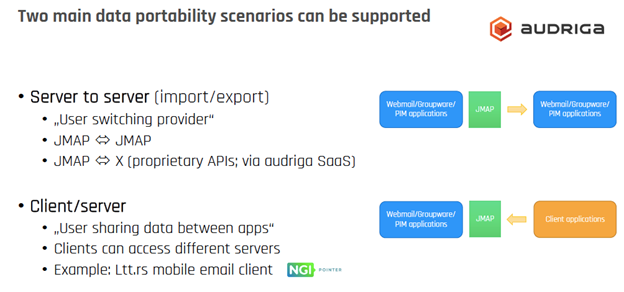by OpenXPort team
The Challenge
Hundreds of millions of users worldwide store their PIM data such as contacts, appointments, tasks, notes, or files on internet services. This is true not only for email or groupware messaging services, but also for Social Networks, CRM systems, … and many other applications.
So, what happens to this data when a user decides to change his provider?
Many of the most popular Webmail systems have no well-defined APIs and/or data portability support. Thus, millions of email users are involuntary “locked-in” with a service provider.
The OpenXPort project helps establishing new standards that simplify the transfer of PIM data.
The Solution
The OpenXPort project works on open data formats and protocols to improve data portability for groupware/PIM data such as contacts calendars, tasks, notes, and files. The project makes use of audriga’s comprehensive experience in the field of data portability. Audriga provides self-service data portability tooling for many hosting companies worldwide, and assists organizations and ISPs to switch complete messaging or online storage platforms to other solutions.
Although important standards like vCard/CardDAV and iCalendar/CalDAV do exist, they have limited use when it comes to data portability as they do not cover all types of data, use complex protocols and lack consistency. For this reason, OpenXPort builds on the JMAP family of standards which have been developed within IETF. JMAP is beginning to replace IMAP (email protocol) and is currently being extended to cover contacts, calendars, and tasks. OpenXPort is engaged in the ongoing standardization and extends Open Source servers with JMAP functionalities.
OpenXPort’s JMAP plugins for Roundcube, SqirrelMail, and Horde can already help many of its users to exercise their right to free data portability. They also provide reusable code and blueprints for adding JMAP support to other systems.
Besides simplifying the import and export of data, OpenXPort will also improve the overall interoperability between groupware clients and servers.

Example of scenarios that can benefit from the OpenXPort extended standards for data portability
DAPSI support
The DAPSI consortium provided us with an excellent project infrastructure. In an open and stimulating atmosphere, other DAPSI partners have greatly supported us in bringing out the best for our project. The strong vision of the EU and the DAPSI consortium has also been recognized positively by the community in standardization discussions.
The unique combination of business and technical guidance was hands-on and the one-to-one coaching helped us to sharpen our vision of a JMAP-based ecosystem and to improve market orientation.
DAPSI has brought us in contact with experts in the data portability field and has proposed and encouraged the potential interactions of the project with relevant interest groups and activities outside DAPSI.
DAPSI journey – Achievements from the first phase of the DAPSI programme
We started the project by talking to customers interested in Roundcube and introducing the OpenXPort project to the community. We also attended the CalConnect conference and IETF meeting 109 for discussions about extending JMAP standards. As the JMAP family of standards, which OpenXPort builds upon, is defined by a set of IETF RFCs, the project participated in the IETF JMAP working group.
Furthermore, several apps to add JMAP support to popular Webmail software such as Nextcloud, SquirrelMail, and Roundcube systems have been published. On the client side, we extended a Java Open Source library with code to support JMAP for Contacts and Calendars.
DAPSI journey – Achievements from the second phase of the DAPSI programme
Based on our Open Source implementations, we could successfully deliver proof of concepts for a large platform migration project and the migration of a German University.
Subsequently, we included additional features for those projects, such as initial support for the migration of files, notes and email filter rules using JMAP. We also started to develop a JMAP extension for Horde Groupware, which is another widely used Open Source solution.
We submitted an initial draft for JMAP for Tasks to the IETF, which was initially discussed at IETF meeting 110 in March 2021.
We also used our existing customer base to present our results and discuss their customers’ needs. Currently we are working with two European hosters to launch a Roundcube self-service migration which would help their customers to exercise their data portability rights more easily.
Lessons learnt
audriga has been working in the field of data migration for a very long time. We have to offer insights and lessons learnt from the migration of data from millions of user accounts from and into many different groupware systems.
DAPSI’s call for proposals triggered and enabled us to carry out the OpenXPort project. The feedback from potentials customers, partners and the discussions within the community showed us one more time how important it is the share our experiences. We are convinced that many application domains can either directly benefit from this framework (by re-using parts of it) or from the best practices.
What’s next
We are fortunate to have a diverse set of customers that keeps us informed about market and community needs. We work with hosting companies, ISPs, and with public authorities but also provide a self-service user interface that puts special focus on the ease of use for end users. Thus, we will continue to work on the standardization track for JMAP for Tasks. Similarly, the reference implementation for JMAP for Sieve is underway and we are pursuing JMAP for Files and JMAP for Notes.
More information
- Please visit us at https://www.audriga.com/en/Data_portability/OpenXPort and https://www.audriga.com
- Plugins and JMAP-PHP code can be found at https://github.com/audriga
- For information on IETF JMAP WG see https://datatracker.ietf.org/wg/jmap/about/

